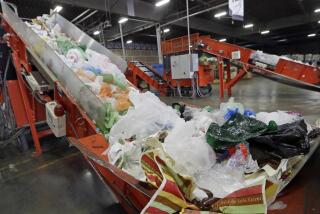So cool to hate bottled water
- Share via
Plastic water bottles have been getting such a bad rap that people have started paying attention, which means that corporate America has started cashing in.
The company that makes Brita water filters teamed up Monday with Nalgene, a manufacturer of reusable beverage containers, to launch the FilterForGood campaign, aimed at weaning people off throwaway bottles.
“Refilling our own personal water bottle with filtered water from the tap requires far less energy and wastes almost no resources relative to bottled water,” said Josh Dorfman, a spokesman for the campaign and the author of “The Lazy Environmentalist: Your Guide to Easy, Stylish, Green Living.”
He called it “an easy thing to accomplish with potentially big results” -- for the environment and, though he didn’t mention it, for sales of Brita filters and Nalgene bottles.
Brita, which is owned by Oakland-based Clorox Co., and Nalgene, a unit of Thermo Fisher Scientific Inc. of Waltham, Mass., are two companies piggybacking on Americans’ plastic-water-bottle remorse. More than 1.5 million barrels of petroleum go into the production of the 38 billion plastic water bottles Americans toss every year.
It was smart marketing that persuaded people that they needed to buy their own personal disposable carriers of gourmet water in the first place, and smart marketing that the anti-plastic forces used to educate the country about the evils of the trend.
Now, companies that sell bottled water, the bottles themselves and other water-related products are taking the environmentalists’ lead by touting their Earth-friendliness.
“There’s a race to trumpet that kind of thing,” said Jeffrey Klineman, an editor at BevNet.com.
And it seems to work. Sigg USA, which promotes its reusable aluminum bottles as eco-friendly and stylish -- “It’s not what you drink,” the Sigg slogan goes, “it’s what you drink it in” -- has seen sales shoot up 200% in the last three months, said Steve Wasik, the company’s general manager.
Siggs are carried in Whole Foods and REI stores, among others; a 20-ouncer goes for about $20. Musical acts like the Fray and Jack Johnson sell them at their concerts. At New York Fashion Week in September, runway models and stylists working for seven designers will carry Siggs filled with tap water under a deal inked with Aveda, a unit of Estee Lauder Cos. that is sponsoring the enterprise.
“Using a Sigg bottle is a smart and simple way to say you care about the environment,” Wasik said.
Sigg rival Nalgene would no doubt beg to differ, and certainly Brita would add that the water should be strained through one of its charcoal filters.
The Brita-Nalgene website launched Monday, www.filterfor good.com, makes several key claims for the green-minded, including that one Brita pitcher filter (a four-pack sells at Target for less than $20) can replace as many as 300 plastic bottles “so you can get great-tasting water without so much waste. Talk about refreshing.”
On the site, people can pledge to reduce their throwaway-bottle consumption. And until Dec. 31 they can buy a FilterForGood refillable bottle (made by Nalgene, of course) for $10, with a donation of as much as $4 made to the Blue Planet Run Foundation, a nonprofit working to provide safe drinking water to 200 million people by 2027.
The companies that sell water in containers not intended for refilling do not plan to be casualties of the bottle wars.
Nestle, which owns such brands as Arrowhead, Poland Spring and Ice Mountain, is rolling out a lightweight bottle that uses 30% less plastic than the current model and sports a paper-saving label that is 30% smaller. The company is investigating other environmentally friendly packaging alternatives, a spokeswoman said.
Coca-Cola Co. has redesigned bottles for its Dasani brand to reduce the use of raw materials by 30% and introduced a cap that can be recycled. Pepsi Co.’s Aquafina -- which under pressure from consumer groups recently began to acknowledge on its bottles that the water inside originates from the tap -- has reduced the weight of its plastic packaging by 40% in the last five years.
“Everyone really wants to be green now,” said David Zutler, chief executive and founder of Biota, a Colorado company that in 2004 opened a factory that makes water bottles out of plastic manufactured from corn. (Biota bottles aren’t sold in stores now; the company is in a legal dispute with an investor and has stopped manufacturing but plans to begin again soon.)
The FilterForGood campaign could be a huge success, but Klineman of BevNet.com doesn’t think Americans will ever give up the convenience of the throwaway bottle.
“People are not going to stop drinking bottled water,” he said. “The question is, what is the industry response going to be?”
More to Read
Inside the business of entertainment
The Wide Shot brings you news, analysis and insights on everything from streaming wars to production — and what it all means for the future.
You may occasionally receive promotional content from the Los Angeles Times.











